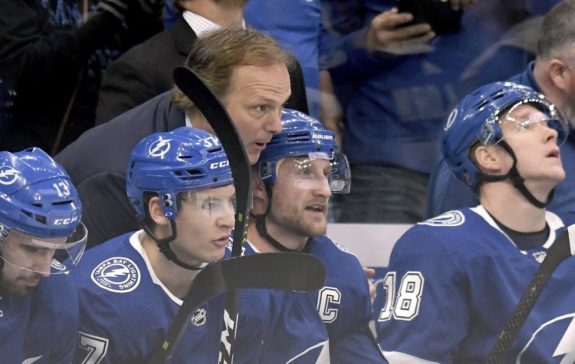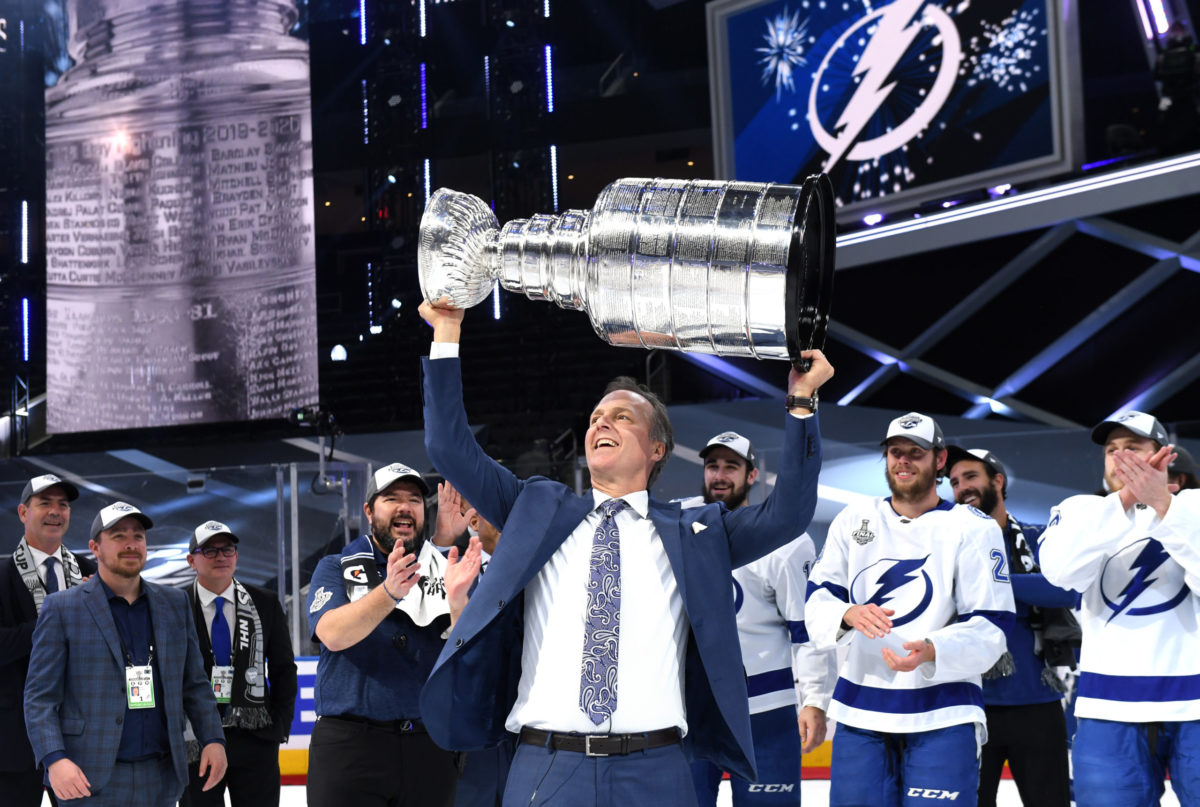The Tampa Bay Lightning came back from down 2-0 to beat the Los Angeles Kings 3-2 in overtime on Tuesday night. From a season-specific standpoint, there was a lot to be excited about. They picked up a huge win against a road warrior and got production from players outside the core.
But there was an even greater sense of achievement with this win. It’s not any ordinary overtime win. This was head coach Jon Cooper‘s 500th career win in the NHL.
Following the game, a video was posted by the Lightning showing Steven Stamkos presenting him with a puck to celebrate the feat. Cooper then gave a humble speech to his players in acknowledgment of the milestone.
Forward Brandon Hagel, who had the game-tying goal in the 500th win, had nothing but praise for Cooper, according to Lightning beat writer Chris Krenn.
Cooper is the 29th head coach in NHL history to win 500 games. But this stat doesn’t do his accomplishment justice. Let’s start with this fact. He’s currently tied with legendary Montreal Canadiens head coach Toe Blake on the all-time wins list. Good company to be in. But Cooper is in plenty more company.
Related: Celebrating Jon Cooper’s 10th Anniversary as Lightning Coach
Among head coaches all time with 500 wins, Cooper has the highest winning percentage (.596). Cooper required the third-fewest games to reach 500 wins in a career (839). The only two coaches ahead of him are Scotty Bowman (825) and Bruce Boudreau (837). Beyond that, Cooper needed the fewest games to reach the mark with a single franchise.
Cooper also separates himself with his unique path to reaching 500 wins in the NHL.
From Lawyer to Head Coach
Cooper said in his speech he never thought he’d coach an NHL game let alone win 500 of them. If you took his path, you would have never thought you would get this far either. As a student at Hofstra University, Cooper was a lacrosse player all four years, playing a single year of club hockey.
His early career path landed him at a law firm as a defense attorney instead of a coach at an arena. While in law school, Cooper got involved with the “Legal Eagles” an adult rec hockey team consisting of lawyers from the Lansing, Michigan area. His time there landed him valuable connections.
One notable connection was Thomas E. Brennan, now a retired district court judge. Brennan’s son was the goalie at Lansing Catholic High School, and Brennan asked Cooper to replace the recently fired coach. Cooper landed his first head coaching job.
Following his success at Lansing Catholic, Cooper moved up to Junior hockey as an assistant coach for the Captial Centre Pride. This would be the only assistant role he’d have the rest of the way. He became the head coach of the Metro Jets in the North American 3 Hockey League (then the Central States Hockey League). He coached the Jets to the Hurster (now Silver) Cup. Going forward, championships were a trend for Cooper.
Cooper became the head coach of the Texarkana/St. Louis Bandits in the North American Hockey League (NAHL). He coached the team for five seasons, winning the Robertson Cup in the final two years of his tenure. The first championship team featured current NHLer Patrick Maroon, who will be part of Cooper’s story again later. His next promotion was to the Green Bay Gamblers in the United States Hockey League (USHL). He won the Clark Cup.
During his time in Juniors, Cooper was named NAHL Coach of the Year three times, along with USHL Coach of the Year. He also won two USHL GM of the Year awards for good measure.
This trophy collection would soon catch the attention of the pros. Cooper became the head coach of the Norfolk Admirals, then the American Hockey League (AHL) affiliate of the Lightning. In his second season, he won the Calder Cup, along with the Louis AR Pieri Memorial Award (AHL Coach of the Year). During his third AHL season, now with the Syracuse Crunch, the Lightning parted ways with head coach Guy Boucher and general manager Steve Yzerman gave Cooper the ultimate promotion.
Tampa Bay Calls Up Cooper
Cooper made his head coaching debut on March 29, 2013. The Lightning beat the New Jersey Devils 5-4 in the shootout. He finished 5-9-3 in his 17 games that season. The Lightning made the playoffs the following year and reached the Stanley Cup Final in Cooper’s second full season at the helm.

The Lightning continued to contend, but the top of the mountain evaded Cooper for a few years longer than at other levels he coached. The Lightning reached the Eastern Conference Final in 2016 and 2018, but they lost in seven games twice. Then, there was the infamous sweep by Columbus followed by the COVID shutdown stalling the 2019-20 season.
Cooper and the Lightning arrived in the bubble, ready to finally reach the top of the mountain. On Sept. 28, 2020, 20 years after his time with the Legal Eagles, after six years in Juniors, after two and a half years in the AHL and in his seventh full season in the NHL. He had done it. Cooper was a Stanley Cup champion. He had now won it all at every level he had coached.

The Lighting repeated in 2021 and reached a third-straight Stanley Cup Final in 2022. Remember how he won the Robertson Cup with Maroon? Well, the two reunited for those three seasons, further intertwining their journeys.
Cooper has also coached the NHL All-Star Game twice. Now, he joins another prestigious club, and he’s only going to win more games from here on out.
He now gets to be compared to the legends who coached Maurice “The Rocket” Richard, Jean Beliveau, Guy Lefleur and Steve Yzerman (funny how that last one goes full circle). If you want to go a step further for some extra, Cooper gets Andrei Vasilevkiy like Blake had Jacques Plante, and Bowman had Ken Dryden before him.
For someone who never thought he’d coach an NHL, he has accomplished more than nearly anyone can even think to imagine.
